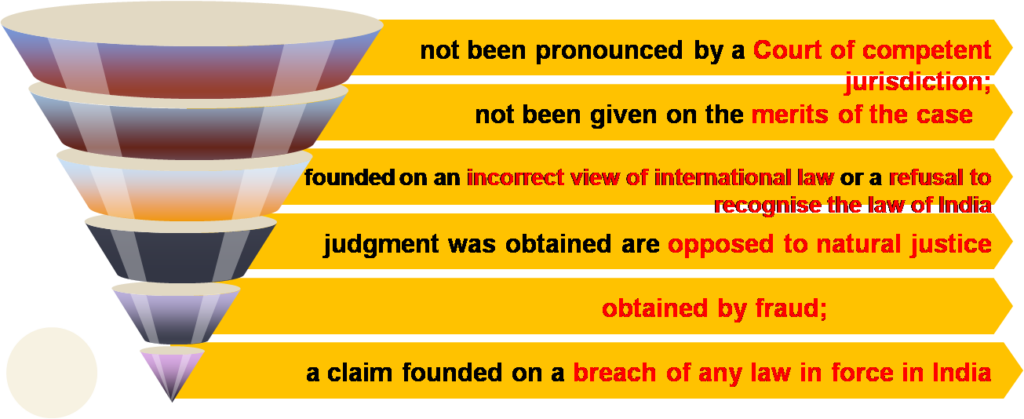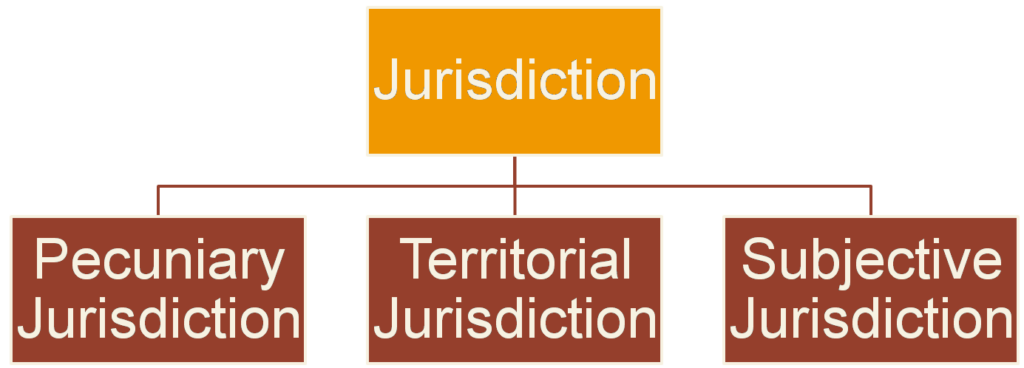Jurisdiction
According To Merriam – Webster
Definition of jurisdiction
1: the power, right, or authority to interpret and apply the lawa matter that falls within the court’s jurisdiction
2a: the authority of a sovereign power to govern or legislate
b: the power or right to exercise authority : CONTROL
3: the limits or territory within which authority may be exercised
According to Cambridge Dictionary
Jurisdiction means the authority of a court or official organization to make decisions and judgments :
Jurisdiction means and includes any authority conferred by the law upon the court, tribunal or judge to decide or adjudicate any dispute between the parties or pass judgment or order. Jurisdiction is key question for the court which goes to the root of the case and decide the fate of matter either at preliminary stage or on merit. If any order passed without jurisdiction, it becomes nullity and not enforceable by law.
A decree without jurisdiction is nullity and may be questioned at any stage including execution or even in collateral proceedings vide Kiran Singh v. Chaman Paswan, AIR 1954 SC 340 (followed in innumerable authorities by the Supreme Court
The CPC does not define the term jurisdiction. In fact, none of the substantive or procedural laws seeks to define the term “jurisdiction”.
The Calcutta High Court in a full bench judgment in Hirday Nath v. Ram Chandra AIR 1921 Cal 34 sought to explain the term jurisdiction. It stated “… jurisdiction may be defined to be the power of Court to hear and determine a cause, to adjudicate and exercise any judicial power in relation to it; in other words, by jurisdiction is meant the authority which a court has to decide matters presented in a formal way for its decision.”
It must be mentioned that the jurisdiction of the court is not whether the court is entitled to pass a particular order or decree in a suit. It is whether the court has the right to hear the particular case. Further, also the jurisdiction is decided by the allegations made in the plaint, and not the defence’s arguments.
In para 6 of Kiran Singh it was held as follows:-
“it is a fundamental principle well established that a decree passed by a court without jurisdiction is a nullity and that its invalidity could be set up whenever and wherever it is sought to be enforced or relied upon, even at the stage of execution and even in collateral proceedings. A defect of jurisdiction, whether it is pecuniary or territorial or whether, it is in respect of the subject – matter of action, strikes at the very authority of the court to pass any decree, and such a defect cannot be cured even by consent of parties”
The Supreme Court held in the Case of Hasham Abbas Sayyad v. Usman Abbas Sayyad AIR 2007 SC 1077
“21. The core question is as to whether an order passed by a person lacking inherent jurisdiction would be a nullity. It will be so. The principles of estoppel, waiver and acquiescence or even resjudicata which are procedural in nature would have no application in a case where an order has been passed by the Tribunal/ Court which has no authority in that behalf. Any order passed by a court without jurisdiction would be coram non judice being a nullity, the same ordinarily should not be given effect to.”
Section -13 – Circumstances when a Foreign Jugment is Not Conclusive

Kinds of Jurisdiction

Pecuniary jurisdiction
Pecuniary Jurisdiction refers to the authority of the Court to hear and decide the case on the basis of monetary value of the subject –matter of the suit as pleaded in the suit.
All civil courts are not the same, every civil court has its own pecuniary limits to try a suit, it can not take any suit which does not fall under its monetary limit, this is known as pecuniary jurisdiction.
Section 6 of the CPC provides that the court will have jurisdiction only over those suits where the amount or value of the subject matter does not exceed the pecuniary limit of its jurisdiction. Additionally, in Section 15 mentioned, every suit shall be instituted in the court of the lowest grade competent to try.
As per A.P Civil Courts Act the pecuniary jurisdiction of the courts is as follows: Suits amounting up to Rs.3,00,000/- lie before the Junior Civil Judge’s Courts. Suits over 3,00,000/- and but not exceeding Rs. 15,00,000/- lie before the Senior Civil Judge’s Courts and exceeding Rs. 15,00,000/- lie before District Courts whereas In Bihar the pecuniary Jurisdiction of a Civil Judge (Junior Division) is upto 150000 INR over this but not exceeding 1000000 INR Civil Judge (Senior Judge)
The main objective of establishing pecuniary jurisdiction is to prevent the court of a higher level from getting burdened and to provide assistance to the parties. However, the court shall interfere if it finds the judgment to be wrong. For example, ’A ’wants to accuse ‘B’ due to a violation of the contract to obtain Rs 5000 in Bombay. The Bombay High Court has original jurisdiction and small causes court with the jurisdiction up to Rs 50000. So, a suit to obtain Rs 5000 should ideally be dealt with small causes court. In the case of Karan Singh Vs Chaman Paswan the plaintiff filed a suit in the subordinate court involving an amount of Rs 2950, but the court rejected the case. Later his next appeal was allowed by the High Court, but it ordered him to pay the deficit amount. The appellant contested that the decision of the district court will be a nullity, but the High Court dismissed the claim. Later the Supreme Court confirmed the decision of the High Court declaring that the decision of district court won’t be void.
Territorial Jurisdiction
Territorial Jurisdiction is also known as Local Jurisdiction . – The Territory within which a court can exercise its powers is called its territorial Jurisdiction.
Every Court has its local or territorial jurisdiction as defined by the government, courts cannot take or try any case that is outside of its territorial or local jurisdiction. Section 13 of Civil courts act, 1887 empowers the government to distribute territorial jurisdiction of the civil courts. The territorial jurisdiction of civil courts has mentioned under section 16 to section 21 of the Code of Civil Procedure.
These sections cover in which local jurisdiction a suit would be filed and how to file a suit depending on the subject matter of the suit. These sections can be classified under two heading based on subject matter or nature of the suit;
- Immovable property (as subject matter)
- Movable property and others
Immovable property
Section 16: Suits to be instituted where the subject-matter (immovable property) is situated.
A)In case of immovable property a) If the suit is with regard to recovery, rent, partion, sale, redumption, determination of right of immovable property it shall be instituted in the court with in the local limits of whoes jurisidiction the property is situated.
B)b) Immovable property situated with in the jurisidiction of different courts. In such case the suit may be instituted in any court with in the local limits of whose jurisidiction any portion of the property is situated.
Movable Property
Section 19: Suit for compensation for wrong to person or movables
Where a Suit for compensation for the wrong done to a person or movable property then the suit shall be instituted where the defendant resides or carries on business or personally works for gain if these areas are different then one another then the plaintiff can choose from any one of them.
Subjective Jurisdiction
Subjective Jurisdiction or Subject Matter Jurisdiction. The courts are divided on the basis of Subject – Matter on which they can entertain a suit.
There are a number of Civil Courts that are dedicated to deal with different kinds of suits of civil nature, i.e Family Court , NCLT, Tax Tribunals
Different courts have been empowered to decide different types of suits. Certain courts have no jurisdiction to entertain certain suits. For examples, suits for testamentary succession, divorce cases, probate proceedings, insolvency matters, etc. cannot be entertained by a Court of Civil Judge (Junior Division). This is called jurisdiction as to subject matter.
This mean, every courts have been allotted the subject over which the court can entertain the matter, and the subject which is not within the preview of the court, that court cannot deal with that matters at all.
Other Kinds Of Jurisdiction









No comment